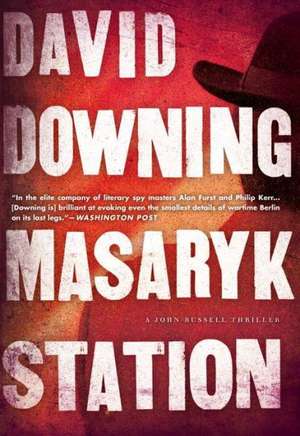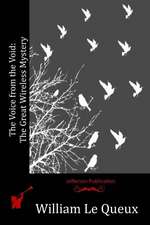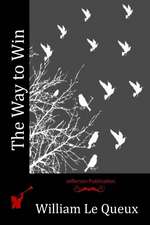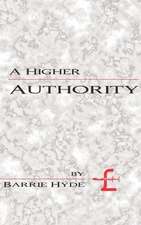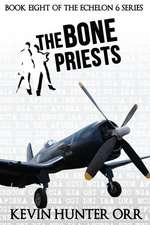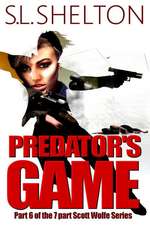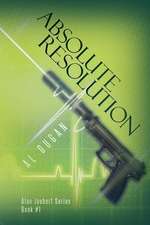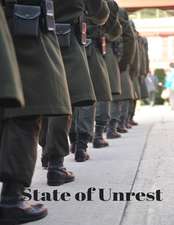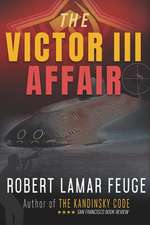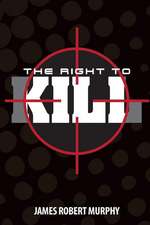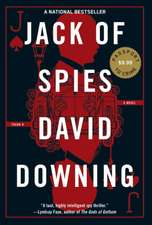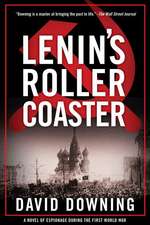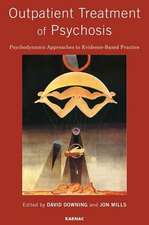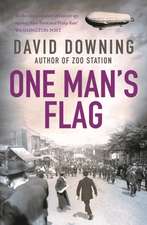Masaryk Station: Soho Crime
Autor David Downingen Limba Engleză Paperback – 31 mar 2014
John Russell works for both Stalin's NKVD and the newly created CIA, trying his best to cut himself loose from both before his double-agency is discovered by either. As tensions between the great powers escalate, each passing day makes Russell’s position more treacherous. He and his Soviet liaison, Shchepkin, seek out one final operation—one piece of intelligence so damning it could silence the wrath of one nation and solicit the protection of the other. It will be the most dangerous task Russell has ever taken on, but one way or the other, it will be his last.
| Toate formatele și edițiile | Preț | Express |
|---|---|---|
| Paperback (2) | 51.21 lei 22-36 zile | +8.77 lei 5-11 zile |
| Old Street Publishing Ltd – 7 ian 2014 | 51.21 lei 22-36 zile | +8.77 lei 5-11 zile |
| Old Street Publishing Ltd – 25 iun 2013 | 83.32 lei 22-36 zile | +14.49 lei 5-11 zile |
Preț: 99.99 lei
Nou
Puncte Express: 150
Preț estimativ în valută:
19.13€ • 19.86$ • 15.96£
19.13€ • 19.86$ • 15.96£
Carte indisponibilă temporar
Doresc să fiu notificat când acest titlu va fi disponibil:
Se trimite...
Preluare comenzi: 021 569.72.76
Specificații
ISBN-13: 9781616953737
ISBN-10: 161695373X
Pagini: 384
Dimensiuni: 127 x 194 x 26 mm
Greutate: 0.43 kg
Editura: Soho Crime
Colecția Soho Crime
Seriile Soho Crime, John Russell WWII Spy Thriller
ISBN-10: 161695373X
Pagini: 384
Dimensiuni: 127 x 194 x 26 mm
Greutate: 0.43 kg
Editura: Soho Crime
Colecția Soho Crime
Seriile Soho Crime, John Russell WWII Spy Thriller
Notă biografică
David Downing grew up in suburban London. He is the author of five previous books in the John Russell series, Zoo Station, Silesian Station, Stettin Station, Potsdam Station, and Lehrter Station. He lives with his wife, an American
acupuncturist, in Guildford, England.
acupuncturist, in Guildford, England.
Extras
February 11, 1948
They were on their way to bed when the two Russians arrived, but the lateness of the hour was apparently irrelevant—she and her sister were to come at once. She asked if they knew who she was, but of course they did. Refusal was not an option.
Their destination was also secret. "Very nice house," the one with some German told them, as if that might make all the difference. He even helped her into the fur coat. Nina looked terribly scared, but the best she could do was squeeze her sister’s hand as they sat in the back of the gleaming Audi.
Soon the car was purring its way eastward along a dimly-lit and mostly empty Frankfurter Allee. The men in the front exchanged an occasional line in Russian, but were mostly silent.
Like thousands of others she’d been raped in ’45, but only on the one occasion. The three soldiers had been too excited by her house and possessions to do more than satisfy their immediate lust.
And now it was going to happen again. In a "very nice house."
She could feel her sister quivering beside her. Nina had only been twelve in ’45, tall for her age, but still with the chest and hips of a child, and the soldiers had left her alone. She had blossomed since, but was still a virgin. This was going to be so much harder for her.
They were leaving the city behind, driving through snow-covered fields. Three years after the war, the road signs caught in the headlamp beams bore Cyrillic script, and she had only the vaguest idea where they were. Not that it mattered.
They turned off the road up a tree-lined drive, and swung to a halt before a large three-storey house. There were soldiers on guard either side of the door, and another inside who gave them both a curious look. There was only one man in civilian clothes and he had a classic Russian face. This was an enemy camp, she thought. There wouldn’t be anyone there to whom they could appeal.
They were hustled upstairs and down a richly-carpeted corridor to a door at its end. One of their escorts tapped it lightly with his knuckles, then responded to words from within by pushing it open and ushering them inside.
It was a large room, with several arm chairs and a large four poster bed. A fire was burning in the grate, and several electric lamps were glowing behind their shades, but the light was far from bright. She had never been in a brothel, but she imagined the better ones looked like this.
And then she saw who it was, and her heart and stomach seemed to plummet.
He was wearing a dressing-gown, and probably nothing else. The smile on his face was only for himself.
After calmly locking the door, he walked to a table holding several bottles, poured himself a tumbler-full of clear liquid, and gulped half of it down. As he turned back to them the fire briefly glinted in his spectacles.
"Zieh dich aus," he said. Take off your clothes.
"No," Nina almost whispered.
"We must do as he says," she told her sister.
Nina stared back at her. There was fear in her eyes, and pleading, and sheer disbelief.
"Take me," she begged him. "She’s only a girl, take me."
If he understood her—and she thought he did—all it did was increase his impatience.
They slowly stripped to their underwear, pausing there without much hope.
He gestured for them to continue, then stared at their naked bodies. She watched his growing erection strain at the dressing gown, then finally break free. Nina’s gasp made him smile. He took two steps forward, grabbed her wrist, and tugged her towards the bed.
Nina jerked herself free and ran for the door, which rattled loudly but resisted her attempt to pull it off its hinges. As he crossed the room in pursuit, she tried to block his way, but he grabbed her by the arm and casually threw her aside.
Nina grabbed a convenient ashtray, and hurled it in his direction. She didn’t see where it struck him, but the grunt of pain as he doubled over left little room for doubt..
For a few brief seconds the world stood still.
Then he gingerly walked to his desk, and took a gun from the drawer.
"No," she screamed, scrambling towards him.
He lashed out with the barrel, catching her across the cheek and putting her back on the carpet.
Nina had sunk to her knees, and now he stood before her, his penis dangling in front of her face. He lifted her hair with the gun, and slowly walked around her, his erection returning.
She thought he would force the sobbing girl to suck him off, but what could she do that wouldn’t make things worse?
And then he was had the barrel of the gun in the nape of Nina’s neck, and his finger was pulling the trigger. There was no explosion, just a coughing sound, an almost derisory spurt of blood, a silent Nina crumpling onto the carpet.
She tried to speak, to rise from the floor, but both were beyond her.
He came across the room, gun in hand. Expecting to die, she felt almost disoriented when he pulled her up by her hair, and threw her face down on the bed. There was cold metal in the back of her neck, but his hands were wrenching her legs apart, and she knew there was one last thing to endure before she joined her sister.
And then he was ramming himself inside her, and urgently pumping away. It only lasted a few seconds, and once he was out again, she lay there waiting for an end to it all, for the blackness the bullet would bring.
It didn’t come. After several moments his hands reached down for one of hers, and cradled it around the butt of the pistol. At first she didn’t resist, and by the time she realised the implication, he had taken it back again.
"You’re too famous to kill," he said in explanation.
Crusaders
The Russian was almost certainly lying, but John Russell had no intention of sharing this suspicion with his British and American employers. If there was one thing he’d learnt over the last few years, it was never to divulge any information without first thoroughly assessing how much it might be worth in money, favours or blood.
The British major and American captain who shared command of the Trieste interrogation centre seemed less inclined to doubt the Russian. A kind reading might have them lacking Russell’s suspicious nature, though one would have thought that a necessary qualification for intelligence officers. Being about half his age and coming from two different realms of Anglo-American privilege, they certainly lacked his experience of European intrigue. But having said all that, a third explanation for their naivety—that both were essentially idiots—seemed by far the most relevant.
The Brit’s name was Alex Farquhar-Smith, and Russell would have bet money on a rural pile, minor public school and Oxford. At the latter he had probably spent more time rowing than reading, and only been saved from a poor Third by a timely world war. The Yank, Buzz Dempsey, was a Chicago boy with a haircut to suit his name, and a brashness only slightly less annoying than his English colleague’s emotional constipation. Usually they spent most of their working hours getting up each other’s noses, but today they were both too excited.
The source of their exhilaration was the tall, rather elegant, chain-smoking Soviet major sitting on the other side of the table. "I have some information about the Red Army’s battle order in Hungary," Petr Kuznakov had casually mentioned on arriving in Trieste the previous day, as if unaware that such intelligence was the current holy grail of every American and British officer charged with debriefing the steady stream of defectors and refugees from Stalin’s rapidly coagulating empire. That had made Russell suspicious, as had the Russian’s choice of Trieste. Had his superiors calculated that the chances of encountering real professionals would be less in such a relative backwater? If so, they’d done their homework.
The Russian lit another cigarette and said, for the fourth or fifth time, that the NKVD would be frantically looking for him, and that he would be of no use to "the great world of freedom" if his new friends allowed him to be killed. Surely it was time to move him somewhere safe, where they could discuss what sort of life they were offering in exchange for everything he knew.
Russell translated this as faithfully as he could; so far that day he had seen no potential benefit in concealing anything specific from the two English-speakers.
"Tell him he’s quite safe here," Farquhar-Smith said reassuringly. "But don’t tell him why," he added for the third time that morning, as if afraid that Russell had the attention span of a three year-old.
He did as he was told, and was treated to another look of hurt incomprehension from Kuznakov. Russell had a sneaking feeling that the Russian already knew about the tip-off, and the two Ukrainians in the Old City hotel. He said he was worried, but the eyes seemed very calm for a man expecting his executioners.
On that thought, the telephone rang. Dempsey went to answer it, and the rest of them sat there in silence, trying in vain to decipher the American’s murmured responses. Call concluded, they heard him go outside, where the half-dozen soldiers had been waiting all morning. A few minutes later he was back. "They’re on their way,"he told Russell and Farquhar-Smith. "They’ll be here in about ten minutes."
"Just the two of them?" Russell asked, in case Dempsey had forgotten to.
"Yeah. You take Ivan here out to the stables, and we’ll come get you when it’s all over."
"But don’t tell him anything," Farquhar-Smith added. "We don’t want him getting too high an opinion of himself." He gave the Russian a smile as he said it, and received one back in return.
They deserved each other, Russell thought, as he escorted the Russian across the courtyard and down the side of the villa to the stable block. There were no horses in residence; all had been stolen by the locals three years earlier after the Italian fascist owner’s mysterious plummet down the property’s well. A horsey odour persisted though, and Russell took up position outside the entrance, where the sweeter smell of pine wafted by on the warm breeze, his ears pricked for the sound of an approaching vehicle. Kuznakov had asked what was happening, but only belatedly, as if remembering he should. There was watchfulness in the Russian’s eyes, but no hint of alarm.
In the event, the two Ukrainians must have parked their car down the road and walked up, because the first thing Russell heard was gunfire. Quite a lot of it in a very short time. In the enduring silence that followed, he saw the look on Kuznakov’s face change from slight trepidation to something approaching satisfaction.
The birds were finding their voices again when Dempsey came to fetch them. The two would-be assassins were lying bloody and crumpled on the courtyard stones, their British killers arguing ownership of the shiny new Soviet machine pistols. Neither of the dead men looked particularly young, and both had tattoos visible on their bare forearms which Russell recognised. These two Ukrainians had fought in the SS Galician Division; there would be other tattoos on their upper arms announcing their blood groups. Strange people for the NKVD to employ, if survival was desired.
There was no sign that Dempsey and Farquhar-Smith had worked it out—on the contrary, they seemed slightly more respectful toward their Soviet guest, and eager to continue with the interrogation. Not that they learned very much. Over the next three hours Kuznakov promised a lot but revealed little, teasing his audience with the assurance of a veteran stripper. He would only tell them everything when he really felt safe, he repeated more than once, before casually specifying another cache of vital intelligence which he could hardly wait to divulge.
It was almost six when Russell’s bosses decided to call it day, and by that time the four of them could barely make each other out through the fug of Russian smoke. Outside the sky was clear, the sun sinking behind the wall of pines which lined the southern border of the property. Leaving Farquhar-Smith to sort out the nocturnal arrangements, Russell and Dempsey roared off in the latter’s jeep, and were soon bouncing down the Ljubljana road, city and sea spread out before them. There was already an evening chill, but the short drive rarely failed to raise Russell’s spirits, no matter how depressing the events of the day.
He had been in Trieste for two months, having been loaned out by the American Berlin Operations Base ߝ "BOB" for short ߝ for "a week or two," after the local Russian interpreter’s wife had been taken ill back home in the States. At this point in time, all the American intelligence organisations in Europe—and there were a bewildering number of them—had only three Russian speakers between them, and since Russell was one of two in Berlin, a fortnight’s temporary secondment to the joint Anglo-American unit in Trieste had been considered acceptable. And by the time news arrived that his predecessor had died in a New Jersey highway pile-up, a veritable flood of interesting-looking defectors had stumbled into Trieste with stories to tell, and Russell had been declared indispensable by Messrs Farquhar-Smith and Dempsey. A replacement was always on the way, but never seemed to arrive.
In truth, Russell was not altogether sorry to be away from Berlin. He missed Effi of course, but she was currently shooting another movie for the Soviet-backed DEFA production company, and he knew from long experience how little he saw her when she was working. The German capital was still on its knees in most of the ways that counted, and over the previous winter the threat of a Soviet takeover had loomed larger with each passing week. Having failed to win control of the city’s Western sectors through political chicanery, the Russians had opted for economic pressure—exploiting the western sectors’ position deep inside the Soviet Zone, and their consequent reliance on Russian good will for all their fuel and food. Until a couple of weeks ago, it had all seemed little more than gestures, but on April Fool’s Day—a scant twenty-four hours after the US Congress approved the Marshall Plan—the Soviet authorities in Germany had upped the stakes, placing new restrictions on traffic using the road, rail and air corridors which linked Berlin with the Western zones. This had continued for several days, until a Soviet fighter had buzzed an American cargo plane a little too closely and brought them both down. Since then, things had got back to normal, but no one knew for how long.
Berlin’s intelligence outfits would still be in a frenzy, and that was something worth missing. His American controller Brent Johannsen, though a decent enough man, was handicapped by his ignorance of Europe in general and the Soviets in particular, and his misreading of the latter’s intentions could be downright dangerous to his subordinates. Russell’s Soviet controller Andrei Tikhomirov was usually too drunk to bother with orders, but in January he and Yevgeny Shchepkin had been farmed out to one of the new K-5 whiz kids, a young Berliner named Schneider, who seemed to think the best way to impress his Russian mentors was to behave like the Gestapo.
No, Effi might be calling him home, but Berlin most definitely wasn’t. Trieste was a monument to failure, a city crowded with people who only wanted to leave—it often reminded Russell of a film called Casablanca which he’d seen during the war—but the food and weather were a huge improvement on Berlin’s. And the "Rat Line" story he’d been working on for over a month was making him feel like a journalist again. Over the last three years he had almost forgotten how much he enjoyed digging up such stories, sod by clinging sod.
"This okay?" Dempsey asked him, breaking his reverie. The American had stopped outside a tobacconist’s about halfway down the Via del Corso. "I need a new pipe," he added. In the distance there was some sort of demonstration underway—in Trieste there usually was. Yugoslavs wanting the Italians out, Italians wanting the Yugoslavs out, everyone keen to see the backs of the Brits and the Yanks.
Russell thanked Dempsey for the lift and took the first turning into the Old City’s maze of narrow streets and alleys. His hostel was on a small plaza nestling beneath the steep slope of St Giusto’s hill, a Serb family business which he had judged much cleaner than its Italian neighbour. The supply of hot water was, at best, sporadic, and his clothes always came back from washing looking remarkably untouched by soap, but he liked the proprietor Marko and his ever-cheerful wife Mira, not to mention their seven or eight children, several of whom were almost guaranteed to be blocking the staircase with some game or other.
There was no one at the desk, no letters for him in the pigeonhole, and only one daughter on the stairs, twirling hair between her fingers and deep in a book. Russell worked his way round her and let himself in to his home away from home, a room some five metres square with an iron bedstead and faded rug, an armchair that probably remembered the Habsburgs, and, by day, a wonderful view of receding roofs and the distant Adriatic. The bathroom he shared with his mostly Serbian fellow-guests was just across the hall.
He laid himself out on the over-soft bed, disappointed but hardly surprised by the lack of a letter from Effi—even when "resting," she had never been a great correspondent. In compensation, he re-read the one from Paul which had arrived a few days earlier. As usual, his son’s written language was strangely, almost touchingly, formal. He was marrying Marisa on Friday the 10th of September, and the two of them hoped that Effi and his father would do them the honour of attending the ceremony at St. Mary’s in Kentish Town. Solly Bernstein, Russell’s long-time British agent and Paul’s current employer, would be giving the bride away, Marisa’s parents having died in a Romanian pogrom. Solly also sent his love, and wanted to know where the new story was.
"I’m working on it," Russell murmured to himself. London, like September, seemed a long way away.
They were on their way to bed when the two Russians arrived, but the lateness of the hour was apparently irrelevant—she and her sister were to come at once. She asked if they knew who she was, but of course they did. Refusal was not an option.
Their destination was also secret. "Very nice house," the one with some German told them, as if that might make all the difference. He even helped her into the fur coat. Nina looked terribly scared, but the best she could do was squeeze her sister’s hand as they sat in the back of the gleaming Audi.
Soon the car was purring its way eastward along a dimly-lit and mostly empty Frankfurter Allee. The men in the front exchanged an occasional line in Russian, but were mostly silent.
Like thousands of others she’d been raped in ’45, but only on the one occasion. The three soldiers had been too excited by her house and possessions to do more than satisfy their immediate lust.
And now it was going to happen again. In a "very nice house."
She could feel her sister quivering beside her. Nina had only been twelve in ’45, tall for her age, but still with the chest and hips of a child, and the soldiers had left her alone. She had blossomed since, but was still a virgin. This was going to be so much harder for her.
They were leaving the city behind, driving through snow-covered fields. Three years after the war, the road signs caught in the headlamp beams bore Cyrillic script, and she had only the vaguest idea where they were. Not that it mattered.
They turned off the road up a tree-lined drive, and swung to a halt before a large three-storey house. There were soldiers on guard either side of the door, and another inside who gave them both a curious look. There was only one man in civilian clothes and he had a classic Russian face. This was an enemy camp, she thought. There wouldn’t be anyone there to whom they could appeal.
They were hustled upstairs and down a richly-carpeted corridor to a door at its end. One of their escorts tapped it lightly with his knuckles, then responded to words from within by pushing it open and ushering them inside.
It was a large room, with several arm chairs and a large four poster bed. A fire was burning in the grate, and several electric lamps were glowing behind their shades, but the light was far from bright. She had never been in a brothel, but she imagined the better ones looked like this.
And then she saw who it was, and her heart and stomach seemed to plummet.
He was wearing a dressing-gown, and probably nothing else. The smile on his face was only for himself.
After calmly locking the door, he walked to a table holding several bottles, poured himself a tumbler-full of clear liquid, and gulped half of it down. As he turned back to them the fire briefly glinted in his spectacles.
"Zieh dich aus," he said. Take off your clothes.
"No," Nina almost whispered.
"We must do as he says," she told her sister.
Nina stared back at her. There was fear in her eyes, and pleading, and sheer disbelief.
"Take me," she begged him. "She’s only a girl, take me."
If he understood her—and she thought he did—all it did was increase his impatience.
They slowly stripped to their underwear, pausing there without much hope.
He gestured for them to continue, then stared at their naked bodies. She watched his growing erection strain at the dressing gown, then finally break free. Nina’s gasp made him smile. He took two steps forward, grabbed her wrist, and tugged her towards the bed.
Nina jerked herself free and ran for the door, which rattled loudly but resisted her attempt to pull it off its hinges. As he crossed the room in pursuit, she tried to block his way, but he grabbed her by the arm and casually threw her aside.
Nina grabbed a convenient ashtray, and hurled it in his direction. She didn’t see where it struck him, but the grunt of pain as he doubled over left little room for doubt..
For a few brief seconds the world stood still.
Then he gingerly walked to his desk, and took a gun from the drawer.
"No," she screamed, scrambling towards him.
He lashed out with the barrel, catching her across the cheek and putting her back on the carpet.
Nina had sunk to her knees, and now he stood before her, his penis dangling in front of her face. He lifted her hair with the gun, and slowly walked around her, his erection returning.
She thought he would force the sobbing girl to suck him off, but what could she do that wouldn’t make things worse?
And then he was had the barrel of the gun in the nape of Nina’s neck, and his finger was pulling the trigger. There was no explosion, just a coughing sound, an almost derisory spurt of blood, a silent Nina crumpling onto the carpet.
She tried to speak, to rise from the floor, but both were beyond her.
He came across the room, gun in hand. Expecting to die, she felt almost disoriented when he pulled her up by her hair, and threw her face down on the bed. There was cold metal in the back of her neck, but his hands were wrenching her legs apart, and she knew there was one last thing to endure before she joined her sister.
And then he was ramming himself inside her, and urgently pumping away. It only lasted a few seconds, and once he was out again, she lay there waiting for an end to it all, for the blackness the bullet would bring.
It didn’t come. After several moments his hands reached down for one of hers, and cradled it around the butt of the pistol. At first she didn’t resist, and by the time she realised the implication, he had taken it back again.
"You’re too famous to kill," he said in explanation.
Crusaders
The Russian was almost certainly lying, but John Russell had no intention of sharing this suspicion with his British and American employers. If there was one thing he’d learnt over the last few years, it was never to divulge any information without first thoroughly assessing how much it might be worth in money, favours or blood.
The British major and American captain who shared command of the Trieste interrogation centre seemed less inclined to doubt the Russian. A kind reading might have them lacking Russell’s suspicious nature, though one would have thought that a necessary qualification for intelligence officers. Being about half his age and coming from two different realms of Anglo-American privilege, they certainly lacked his experience of European intrigue. But having said all that, a third explanation for their naivety—that both were essentially idiots—seemed by far the most relevant.
The Brit’s name was Alex Farquhar-Smith, and Russell would have bet money on a rural pile, minor public school and Oxford. At the latter he had probably spent more time rowing than reading, and only been saved from a poor Third by a timely world war. The Yank, Buzz Dempsey, was a Chicago boy with a haircut to suit his name, and a brashness only slightly less annoying than his English colleague’s emotional constipation. Usually they spent most of their working hours getting up each other’s noses, but today they were both too excited.
The source of their exhilaration was the tall, rather elegant, chain-smoking Soviet major sitting on the other side of the table. "I have some information about the Red Army’s battle order in Hungary," Petr Kuznakov had casually mentioned on arriving in Trieste the previous day, as if unaware that such intelligence was the current holy grail of every American and British officer charged with debriefing the steady stream of defectors and refugees from Stalin’s rapidly coagulating empire. That had made Russell suspicious, as had the Russian’s choice of Trieste. Had his superiors calculated that the chances of encountering real professionals would be less in such a relative backwater? If so, they’d done their homework.
The Russian lit another cigarette and said, for the fourth or fifth time, that the NKVD would be frantically looking for him, and that he would be of no use to "the great world of freedom" if his new friends allowed him to be killed. Surely it was time to move him somewhere safe, where they could discuss what sort of life they were offering in exchange for everything he knew.
Russell translated this as faithfully as he could; so far that day he had seen no potential benefit in concealing anything specific from the two English-speakers.
"Tell him he’s quite safe here," Farquhar-Smith said reassuringly. "But don’t tell him why," he added for the third time that morning, as if afraid that Russell had the attention span of a three year-old.
He did as he was told, and was treated to another look of hurt incomprehension from Kuznakov. Russell had a sneaking feeling that the Russian already knew about the tip-off, and the two Ukrainians in the Old City hotel. He said he was worried, but the eyes seemed very calm for a man expecting his executioners.
On that thought, the telephone rang. Dempsey went to answer it, and the rest of them sat there in silence, trying in vain to decipher the American’s murmured responses. Call concluded, they heard him go outside, where the half-dozen soldiers had been waiting all morning. A few minutes later he was back. "They’re on their way,"he told Russell and Farquhar-Smith. "They’ll be here in about ten minutes."
"Just the two of them?" Russell asked, in case Dempsey had forgotten to.
"Yeah. You take Ivan here out to the stables, and we’ll come get you when it’s all over."
"But don’t tell him anything," Farquhar-Smith added. "We don’t want him getting too high an opinion of himself." He gave the Russian a smile as he said it, and received one back in return.
They deserved each other, Russell thought, as he escorted the Russian across the courtyard and down the side of the villa to the stable block. There were no horses in residence; all had been stolen by the locals three years earlier after the Italian fascist owner’s mysterious plummet down the property’s well. A horsey odour persisted though, and Russell took up position outside the entrance, where the sweeter smell of pine wafted by on the warm breeze, his ears pricked for the sound of an approaching vehicle. Kuznakov had asked what was happening, but only belatedly, as if remembering he should. There was watchfulness in the Russian’s eyes, but no hint of alarm.
In the event, the two Ukrainians must have parked their car down the road and walked up, because the first thing Russell heard was gunfire. Quite a lot of it in a very short time. In the enduring silence that followed, he saw the look on Kuznakov’s face change from slight trepidation to something approaching satisfaction.
The birds were finding their voices again when Dempsey came to fetch them. The two would-be assassins were lying bloody and crumpled on the courtyard stones, their British killers arguing ownership of the shiny new Soviet machine pistols. Neither of the dead men looked particularly young, and both had tattoos visible on their bare forearms which Russell recognised. These two Ukrainians had fought in the SS Galician Division; there would be other tattoos on their upper arms announcing their blood groups. Strange people for the NKVD to employ, if survival was desired.
There was no sign that Dempsey and Farquhar-Smith had worked it out—on the contrary, they seemed slightly more respectful toward their Soviet guest, and eager to continue with the interrogation. Not that they learned very much. Over the next three hours Kuznakov promised a lot but revealed little, teasing his audience with the assurance of a veteran stripper. He would only tell them everything when he really felt safe, he repeated more than once, before casually specifying another cache of vital intelligence which he could hardly wait to divulge.
It was almost six when Russell’s bosses decided to call it day, and by that time the four of them could barely make each other out through the fug of Russian smoke. Outside the sky was clear, the sun sinking behind the wall of pines which lined the southern border of the property. Leaving Farquhar-Smith to sort out the nocturnal arrangements, Russell and Dempsey roared off in the latter’s jeep, and were soon bouncing down the Ljubljana road, city and sea spread out before them. There was already an evening chill, but the short drive rarely failed to raise Russell’s spirits, no matter how depressing the events of the day.
He had been in Trieste for two months, having been loaned out by the American Berlin Operations Base ߝ "BOB" for short ߝ for "a week or two," after the local Russian interpreter’s wife had been taken ill back home in the States. At this point in time, all the American intelligence organisations in Europe—and there were a bewildering number of them—had only three Russian speakers between them, and since Russell was one of two in Berlin, a fortnight’s temporary secondment to the joint Anglo-American unit in Trieste had been considered acceptable. And by the time news arrived that his predecessor had died in a New Jersey highway pile-up, a veritable flood of interesting-looking defectors had stumbled into Trieste with stories to tell, and Russell had been declared indispensable by Messrs Farquhar-Smith and Dempsey. A replacement was always on the way, but never seemed to arrive.
In truth, Russell was not altogether sorry to be away from Berlin. He missed Effi of course, but she was currently shooting another movie for the Soviet-backed DEFA production company, and he knew from long experience how little he saw her when she was working. The German capital was still on its knees in most of the ways that counted, and over the previous winter the threat of a Soviet takeover had loomed larger with each passing week. Having failed to win control of the city’s Western sectors through political chicanery, the Russians had opted for economic pressure—exploiting the western sectors’ position deep inside the Soviet Zone, and their consequent reliance on Russian good will for all their fuel and food. Until a couple of weeks ago, it had all seemed little more than gestures, but on April Fool’s Day—a scant twenty-four hours after the US Congress approved the Marshall Plan—the Soviet authorities in Germany had upped the stakes, placing new restrictions on traffic using the road, rail and air corridors which linked Berlin with the Western zones. This had continued for several days, until a Soviet fighter had buzzed an American cargo plane a little too closely and brought them both down. Since then, things had got back to normal, but no one knew for how long.
Berlin’s intelligence outfits would still be in a frenzy, and that was something worth missing. His American controller Brent Johannsen, though a decent enough man, was handicapped by his ignorance of Europe in general and the Soviets in particular, and his misreading of the latter’s intentions could be downright dangerous to his subordinates. Russell’s Soviet controller Andrei Tikhomirov was usually too drunk to bother with orders, but in January he and Yevgeny Shchepkin had been farmed out to one of the new K-5 whiz kids, a young Berliner named Schneider, who seemed to think the best way to impress his Russian mentors was to behave like the Gestapo.
No, Effi might be calling him home, but Berlin most definitely wasn’t. Trieste was a monument to failure, a city crowded with people who only wanted to leave—it often reminded Russell of a film called Casablanca which he’d seen during the war—but the food and weather were a huge improvement on Berlin’s. And the "Rat Line" story he’d been working on for over a month was making him feel like a journalist again. Over the last three years he had almost forgotten how much he enjoyed digging up such stories, sod by clinging sod.
"This okay?" Dempsey asked him, breaking his reverie. The American had stopped outside a tobacconist’s about halfway down the Via del Corso. "I need a new pipe," he added. In the distance there was some sort of demonstration underway—in Trieste there usually was. Yugoslavs wanting the Italians out, Italians wanting the Yugoslavs out, everyone keen to see the backs of the Brits and the Yanks.
Russell thanked Dempsey for the lift and took the first turning into the Old City’s maze of narrow streets and alleys. His hostel was on a small plaza nestling beneath the steep slope of St Giusto’s hill, a Serb family business which he had judged much cleaner than its Italian neighbour. The supply of hot water was, at best, sporadic, and his clothes always came back from washing looking remarkably untouched by soap, but he liked the proprietor Marko and his ever-cheerful wife Mira, not to mention their seven or eight children, several of whom were almost guaranteed to be blocking the staircase with some game or other.
There was no one at the desk, no letters for him in the pigeonhole, and only one daughter on the stairs, twirling hair between her fingers and deep in a book. Russell worked his way round her and let himself in to his home away from home, a room some five metres square with an iron bedstead and faded rug, an armchair that probably remembered the Habsburgs, and, by day, a wonderful view of receding roofs and the distant Adriatic. The bathroom he shared with his mostly Serbian fellow-guests was just across the hall.
He laid himself out on the over-soft bed, disappointed but hardly surprised by the lack of a letter from Effi—even when "resting," she had never been a great correspondent. In compensation, he re-read the one from Paul which had arrived a few days earlier. As usual, his son’s written language was strangely, almost touchingly, formal. He was marrying Marisa on Friday the 10th of September, and the two of them hoped that Effi and his father would do them the honour of attending the ceremony at St. Mary’s in Kentish Town. Solly Bernstein, Russell’s long-time British agent and Paul’s current employer, would be giving the bride away, Marisa’s parents having died in a Romanian pogrom. Solly also sent his love, and wanted to know where the new story was.
"I’m working on it," Russell murmured to himself. London, like September, seemed a long way away.
Recenzii
Praise for Masaryk Station
"Epic in scope, Mr. Downing's "Station" cycle creates a fictional universe rich with a historian's expertise but rendered with literary style and heart."
—The Wall Street Journal
"This is a brilliant finale to one of spydom’s best series. If you haven’t read all the others, get them first and enjoy the whole feast."
—The Globe and Mail
"Downing is one of a trio of exceptional writers (Philip Kerr and Alan Furst being the other two) who have managed to re-create a time and place when much of the world seemed to have gone temporarily mad."
—The Denver Post
“Downing’s outstanding evocation of the times (as masterly as that found in Alan Furst’s novels or Philip Kerr’s Bernie Gunther series), thematic complexity (as rich as that of John le Carré), and the wide assortment of fully rendered characters provide as much or more pleasure than the plot, where disparate threads are tied together in satisfying and unexpected ways.”
—Library Journal, STARRED Review
"If your reaction is anything like mine, you'll want to continue through the entire series."
—Books & Culture
”The Station books are without a doubt some of the finest espionage novels these days, easily inviting comparisons to the legends of the genre like John le Carre, Frederick Forsyth and Tom Clancy… You won’t want to read anything else until you have devoured the entire series.”
—BookPage (Top Pick in Mystery)
"David Downing has created a complicated plot with many twists and turns while the hero seems caught in a maze."
—Historical Novel Society
"This is a thrilling and suspenseful espionage series, one of the best being written today. One cares about Russell and his family and even the somewhat oily Shchepkin as they attempt to unravel themselves from the brutal and unfeeling intelligence services. It’s an extremely dangerous time and the likelihood for failure is high. If you like spy novels, you need to read all of the John Russell series."
—Bookgasm
"I loved Masaryk Station. The plot in interesting, but the real point is the insight into the times. It provided insights and aroused emotions in me concerning my own experiences during the Cold War and helped build some perspective over the world events that I, in my youth, only knew asfact."
—Gumshoe Review
"The book is a wonderful introduction to the Berlin Blockade, told through an exciting story with likeable characters."
—Blogcritics.org
Praise for David Downing
"Full of striking inventions."
─Kingsley Amis, author of Lucky Jim
"A beautifully crafted and compelling thriller with a heart-stopping ending as John Russell learns the personal faces of good and evil. An unforgettable read."
─Charles Todd, author of the Inspector Ian Rutledge Series
"One of the most intelligent and persuasive realizations of Germany immediately before the war."
─Wall Street Journal
"In the elite company of literary spy masters Alan Furst and Philip Kerr ... [Downing is] brilliant at evoking even the smallest details of wartime Berlin on its last legs."
─Washington Post
“Downing distinguishes himself by eschewing the easy ways out. He doesn't shy away from portraying the cold brutality of the Third Reich, and his characters are far from stereotypes—they're flawed, confused and real.”
—NPR
From the Hardcover edition.
"Epic in scope, Mr. Downing's "Station" cycle creates a fictional universe rich with a historian's expertise but rendered with literary style and heart."
—The Wall Street Journal
"This is a brilliant finale to one of spydom’s best series. If you haven’t read all the others, get them first and enjoy the whole feast."
—The Globe and Mail
"Downing is one of a trio of exceptional writers (Philip Kerr and Alan Furst being the other two) who have managed to re-create a time and place when much of the world seemed to have gone temporarily mad."
—The Denver Post
“Downing’s outstanding evocation of the times (as masterly as that found in Alan Furst’s novels or Philip Kerr’s Bernie Gunther series), thematic complexity (as rich as that of John le Carré), and the wide assortment of fully rendered characters provide as much or more pleasure than the plot, where disparate threads are tied together in satisfying and unexpected ways.”
—Library Journal, STARRED Review
"If your reaction is anything like mine, you'll want to continue through the entire series."
—Books & Culture
”The Station books are without a doubt some of the finest espionage novels these days, easily inviting comparisons to the legends of the genre like John le Carre, Frederick Forsyth and Tom Clancy… You won’t want to read anything else until you have devoured the entire series.”
—BookPage (Top Pick in Mystery)
"David Downing has created a complicated plot with many twists and turns while the hero seems caught in a maze."
—Historical Novel Society
"This is a thrilling and suspenseful espionage series, one of the best being written today. One cares about Russell and his family and even the somewhat oily Shchepkin as they attempt to unravel themselves from the brutal and unfeeling intelligence services. It’s an extremely dangerous time and the likelihood for failure is high. If you like spy novels, you need to read all of the John Russell series."
—Bookgasm
"I loved Masaryk Station. The plot in interesting, but the real point is the insight into the times. It provided insights and aroused emotions in me concerning my own experiences during the Cold War and helped build some perspective over the world events that I, in my youth, only knew asfact."
—Gumshoe Review
"The book is a wonderful introduction to the Berlin Blockade, told through an exciting story with likeable characters."
—Blogcritics.org
Praise for David Downing
"Full of striking inventions."
─Kingsley Amis, author of Lucky Jim
"A beautifully crafted and compelling thriller with a heart-stopping ending as John Russell learns the personal faces of good and evil. An unforgettable read."
─Charles Todd, author of the Inspector Ian Rutledge Series
"One of the most intelligent and persuasive realizations of Germany immediately before the war."
─Wall Street Journal
"In the elite company of literary spy masters Alan Furst and Philip Kerr ... [Downing is] brilliant at evoking even the smallest details of wartime Berlin on its last legs."
─Washington Post
“Downing distinguishes himself by eschewing the easy ways out. He doesn't shy away from portraying the cold brutality of the Third Reich, and his characters are far from stereotypes—they're flawed, confused and real.”
—NPR
From the Hardcover edition.
